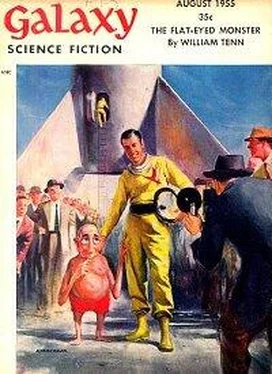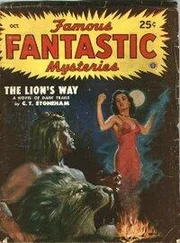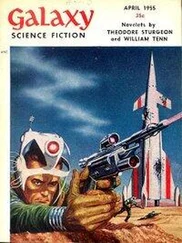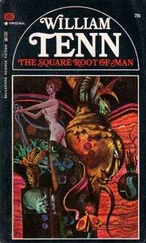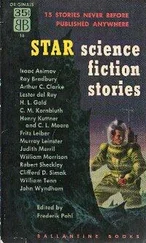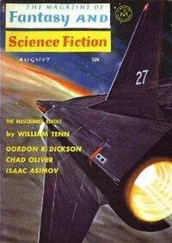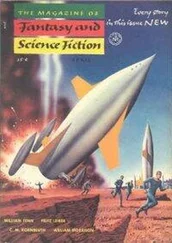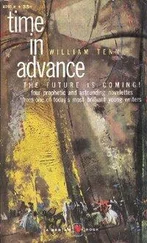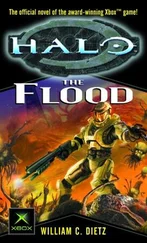William Tenn - The Flat-Eyed Monster
Здесь есть возможность читать онлайн «William Tenn - The Flat-Eyed Monster» весь текст электронной книги совершенно бесплатно (целиком полную версию без сокращений). В некоторых случаях можно слушать аудио, скачать через торрент в формате fb2 и присутствует краткое содержание. Год выпуска: 1955, Издательство: Galaxy Publishing Corporation, Жанр: Фантастика и фэнтези, на английском языке. Описание произведения, (предисловие) а так же отзывы посетителей доступны на портале библиотеки ЛибКат.
- Название:The Flat-Eyed Monster
- Автор:
- Издательство:Galaxy Publishing Corporation
- Жанр:
- Год:1955
- ISBN:нет данных
- Рейтинг книги:5 / 5. Голосов: 1
-
Избранное:Добавить в избранное
- Отзывы:
-
Ваша оценка:
- 100
- 1
- 2
- 3
- 4
- 5
The Flat-Eyed Monster: краткое содержание, описание и аннотация
Предлагаем к чтению аннотацию, описание, краткое содержание или предисловие (зависит от того, что написал сам автор книги «The Flat-Eyed Monster»). Если вы не нашли необходимую информацию о книге — напишите в комментариях, мы постараемся отыскать её.
The Flat-Eyed Monster — читать онлайн бесплатно полную книгу (весь текст) целиком
Ниже представлен текст книги, разбитый по страницам. Система сохранения места последней прочитанной страницы, позволяет с удобством читать онлайн бесплатно книгу «The Flat-Eyed Monster», без необходимости каждый раз заново искать на чём Вы остановились. Поставьте закладку, и сможете в любой момент перейти на страницу, на которой закончили чтение.
Интервал:
Закладка:
“My philosophy—” Lirld began, and broke off to announce—“Here’s your son. Why don’t you ask him? Without the benefit of half a dozen scientific investigations that people like you have wanted to call off time after time, none of his heroic achievements in interplanetary discovery would be possible.”
Thoroughly defeated, but still curious, Manship opened his eyes in time to see an extremely narrow black suitcase swarm up to the tabletop in a spaghetti-cluster of tentacles.
“What is— that?” the newcomer inquired, curling a bunch of supercilious eye-stalks over Manship’s head. “It looks like a yurd with a bad case of hipplestatch.” He considered for a moment, then added, “Galloping hipplestatch.”
“It’s a creature from astronomical unit 649-301-3 that I’ve just succeeded in teleporting to our planet,” Lirld told him proudly. “Mind you, Rabd, without a transmitting outfit on the other end! I admit I don’t know why it worked this time and never before—but that’s a matter for further research. A beautiful specimen, though, Rabd. And as near as we can tell, in perfect condition. You can put it away now, Srin.”
“Oh, no you don’t, Srin—” Manship had barely started to announce when a great rectangle of some pliable material fell from the ceiling and covered him. A moment later, the tabletop on which he’d been sitting seemed to drop away and the ends of the material were gathered in underneath him and fastened with a click by a scuttling individual whom he took to be the assistant. Then, before he had time to so much as wave his arms, the tabletop shot up with an abruptness that he found twice as painful as it was disconcerting.
And there he was, packaged as thoroughly as a birthday present. All in all, things were not improving, he decided. Well, at least they seemed disposed to leave him alone now. And as yet they showed no tendency to shove him up on a laboratory shelf along with dusty jars of flefnobe fetuses pickled in alcohol.
The fact that he was probably the first human being in history to make contact with an extraterrestrial race failed to cheer Clyde Manship in the slightest.
First, he reflected, the contact had been on a distinctly minor key—the sort that an oddly colored moth makes with a collector’s bottle rather than a momentous meeting between the proud representatives of two different civilizations.
Second, and much more important, this sort of hands-across-the-cosmos affair was more likely to enthuse an astronomer, a sociologist or even a physicist than an assistant professor of Comparative Literature.
He’d had fantastic daydreams aplenty in his lifetime. But they concerned being present at the premiere of Macbeth, for example, and watching a sweating Shakespeare implore Burbage not to shout out the “Tomorrow and Tomorrow and Tomorrow” speech in the last act: “For God’s sake, Dick, your wife just died and you’re about to lose your kingdom and your life—don’t let it sound like Meg at the Mermaid screaming for a dozen of ale. Philosophical, Dick, that’s the idea, slow, mournful and philosophical. And just a little bewildered.”
Or he’d imagined being one of the company at that moment sometime before 700 B.C. when a blind poet rose and intoned for the first time: “Anger, extreme anger, that is my tale…”
Or being a house guest at Yasnaya Polyana when Tolstoy wandered in from the garden with an abstracted look on his face and muttered: “Just got an idea for a terrific yarn about the Napoleonic invasion of Russia. And what a title! War and Peace. Nothing pretentious, nothing complicated. Just simply War and Peace. It’ll knock them dead in St. Petersburg, I tell you. Of course, it’s just a bare little short story at the moment, but I’ll probably think of a couple of incidents to pad it out.”
Travel to the Moon and the other planets of the solar system, let alone a voyage to the center of the galaxy—in his pajamas? No, that was definitely not a menu calculated to make Clyde Manship salivate. In this respect, he had wisted no farther afield than a glimpse, say, of Victor Hugo’s sky-high balcony in St. Germain des Pres or the isles of Greece where burning Sappho loved and, from time to time as it occurred to her, sang.
Professor Bowles, now, Bowles or any of the other slipstick-sniffers in the Physics Department—what those boys would give to be in his position! To be the subject of an actual experiment far beyond the dreams of even theory on Earth, to be exposed to a technology that was patently so much more advanced than theirs—why, they would probably consider that, in exchange for all this, the vivisection that Manship was morosely certain would end the evening’s festivities was an excellent bargain and verged on privilege. The Physics Department…
Manship suddenly recalled the intricately weird tower, studded with gray dipoles, that the Physics Department had been erecting in Murphy Field. He’d watched the government-subsidized project in radiation research going up from his window in Callahan Hall.
Only the evening before, when it had reached the height of his window, he’d reflected that it looked more like a medieval siege engine designed to bring down walled cities than a modern communicative device.
But now, with Lirld’s comment about one-way teleportation never having worked before, he found himself wondering whether the uncompleted tower, poking a ragged section of electronic superstructure at his bedroom window, had been partially responsible for this veritable puree-of-nightmare he’d been wading through.
Had it provided a necessary extra link with Lirld’s machine, sort of an aerial connection or grounding wire or whatever? If only he knew a little physics! Eight years of higher education were inadequate to suggest the barest aye or nay.
He gnashed his teeth, went too far and bit his tongue—and was forced to suspend mental operations until the pain died away and the tears dribbled out of his eyes.
What if he knew for certain that the tower had played a potent, though passive, part in his removal through interstellar space? What if he knew the exact part it had played in terms of megavolts and amperages and so forth—would the knowledge be the slightest use to him in this impossible situation?
No, he’d still be a hideous flat-eyed, non-intelligent monster plucked pretty much at random from the outer reaches of the universe, surrounded by creatures to whose minds his substantial knowledge of the many literatures of astronomical unit 649-301-3 would probably come across, allowing even for the miracle of translation, as so much schizophrenic word-salad.
In his despair, he plucked hopelessly at the material in which he’d been wrapped. Two small sections came away in his fingers.
There wasn’t enough light to examine them, but the feel was unmistakable. Paper. He was wrapped in an oversized sheet of something very much like paper.
It made sense, he thought, it made sense in its own weird way. Since the appendages of the flefnobes he had seen to date consisted of nothing more than slender tentacles ending in either eyes or tapered points, and since they seemed to need knoblike protuberances on the laboratory table in order to perch beside him, a cage of paper was pretty much escape-proof from their point of view. There was nothing for their tentacles to grip—and they evidently didn’t have the musculature to punch their way through.
Well, he did. Athletically, he had never amounted to much, but he believed, given enough of an emergency, in his ability to fight his way out of a paper bag. It was a comforting thought, but, at the moment, only slightly more useful than the nugget about the tower in Murphy Field.
Читать дальшеИнтервал:
Закладка:
Похожие книги на «The Flat-Eyed Monster»
Представляем Вашему вниманию похожие книги на «The Flat-Eyed Monster» списком для выбора. Мы отобрали схожую по названию и смыслу литературу в надежде предоставить читателям больше вариантов отыскать новые, интересные, ещё непрочитанные произведения.
Обсуждение, отзывы о книге «The Flat-Eyed Monster» и просто собственные мнения читателей. Оставьте ваши комментарии, напишите, что Вы думаете о произведении, его смысле или главных героях. Укажите что конкретно понравилось, а что нет, и почему Вы так считаете.
